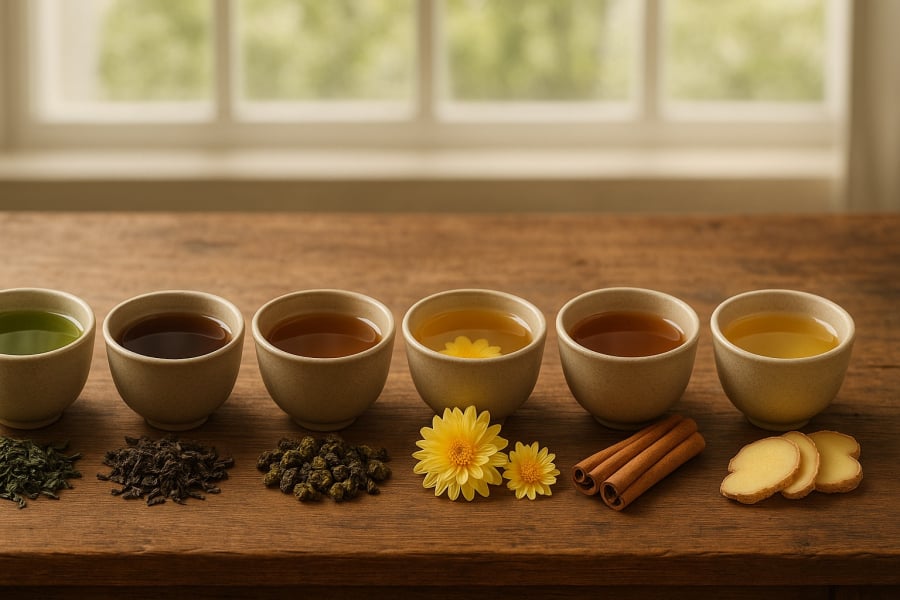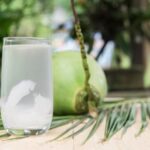Each morning, as you hold your favorite cup of tea, have you ever wondered if it’s a healthy choice for you? For people with diabetes, beverage choices are not just habits but an essential part of their journey to control blood sugar levels. However, with abundant and sometimes conflicting information out there, what are the safe and effective choices?
This article will answer that question by exploring six types of tea that are especially beneficial for people with diabetes. We will go beyond a simple list and delve into the unique qualities of each tea, empowering you to make informed decisions for your health.
6 Diabetic-Friendly Teas
Green Tea
Originating from the leaves of the Camellia sinensis plant, green tea is one of the world’s most beloved beverages. Its delicate flavor and refreshing color make it not only enjoyable but also packed with health benefits, especially for those living with diabetes. Green tea is rich in catechin, a powerful group of antioxidants, with EGCG (epigallocatechin gallate) being the most prominent.
Scientific studies have proven that EGCG can improve insulin sensitivity, reduce blood sugar levels, and protect cells from oxidative stress-induced damage, a critical factor in preventing diabetic complications.
To brew the perfect cup of green tea, use 1-2 tea bags or a teaspoon of loose leaves per cup of hot water at around 80°C for 2-3 minutes. Drinking 2-3 cups daily will maximize its benefits. However, it’s important not to overindulge as green tea contains caffeine, which may disrupt sleep if consumed in excess in the evening.

Black Tea
Black tea, also derived from the Camellia sinensis plant, differs from green tea due to its longer fermentation process, resulting in a bolder, more robust flavor. Black tea contains theaflavins and thearubigins, powerful antioxidants that reduce inflammation and support cardiovascular health. This is particularly important for individuals with diabetes, as they are at a higher risk for heart-related issues.
A 2022 study published in the Journal of Nutrition highlighted the role of theaflavins in improving endothelial function, thereby contributing to a healthy circulatory system.
To prepare black tea, steep one tea bag or a teaspoon of loose tea in boiling water for 3-5 minutes. However, to avoid disrupting your sleep, it’s best to refrain from drinking black tea after 3 pm, especially if you’re sensitive to caffeine.
Oolong Tea
Oolong tea is often described as the bridge between green and black tea, offering a unique flavor profile that combines the freshness of green tea with the depth of black tea. Beyond its appealing taste, oolong tea contains polyphenols and flavonoids, compounds that effectively help regulate blood sugar levels.
According to a study by the University of California, USA, oolong tea slows down glucose absorption after meals, helping to stabilize blood sugar levels. This is especially beneficial for diabetics who often face post-meal blood sugar spikes.
To brew oolong tea, steep 1-2 tea bags in hot water at around 90°C for 4-5 minutes. While oolong tea is generally mild, if you’re taking blood-thinning medication, it’s advisable to consult your doctor before consuming this tea.
Chamomile Tea
Chamomile tea has long been revered as a gentle herbal infusion, known for its soothing aroma and subtle golden color. Its main constituents, apigenin and luteolin, are powerful anti-inflammatory and antioxidant compounds. For diabetics, chamomile tea not only reduces stress but also improves sleep quality, an essential factor in blood sugar management.
Dr. Tran Thi Minh Huong, a nutrition expert at the National Institute of Nutrition, emphasizes, “People with diabetes need a deep and restful sleep to allow their bodies to recover and replenish energy.”
To prepare chamomile tea, steep 3-4 dried chamomile flowers in hot water for about 5 minutes. However, if you have allergies to the daisy family, it’s best to avoid this tea.
Cinnamon Tea
Cinnamon tea, made from the bark of the cinnamon tree, offers a warm aroma and natural sweetness without the need for added sugar. This tea is renowned for its blood sugar-regulating properties. A 2021 study published in Diabetes Care revealed that cinnamon could lower fasting blood sugar levels and improve blood lipids, both crucial factors in diabetes management. Cinnamon’s key components, cinnamaldehyde, and polyphenols possess anti-inflammatory and antibacterial properties.
Preparing cinnamon tea is simple: boil cinnamon bark in water for about 10 minutes, and drink one cup daily. However, it’s important not to exceed a daily intake of 1g of cinnamon, as excessive consumption may harm the liver.
Ginger Tea
Ginger tea, made from fresh ginger root, offers a mild spiciness and warmth, making it an ideal beverage for cold seasons. Beyond its flavor, ginger tea contains gingerol and shogaol, compounds that enhance blood circulation and reduce inflammation. According to a study by the University of Sydney, Australia, ginger can help improve chronic inflammation, a contributing factor to diabetic complications.
To brew ginger tea, slice fresh ginger root thinly and steep it in hot water for 5-7 minutes. While ginger tea is generally safe, pregnant women and individuals with stomach ulcers should exercise caution when consuming it.

Important Considerations When Using Tea for Diabetes Management
Before incorporating any of these teas into your diet, consult your doctor, especially if you’re on medication. Avoid adding sugar or sweeteners to your tea for optimal health benefits. Additionally, regularly monitor your blood sugar levels to assess the effectiveness of your tea choices.
Remember, tea is just one component of a healthy diet and balanced lifestyle. Maintaining a regular exercise routine and adhering to medical advice are equally vital in your diabetes journey.
Conclusion
Incorporate these teas into your daily routine to better manage your blood sugar levels! If you found this article helpful, don’t hesitate to share it with your loved ones.





































